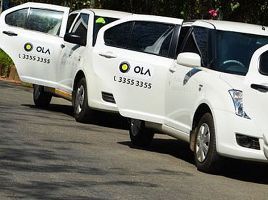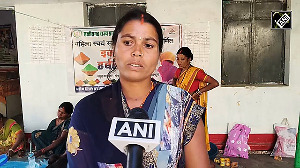Most taxi service providers, currently being probed following the alleged rape of a 27-year-old woman in Delhi by an Uber cab driver, are under financial stress.
 Six weeks ago, Masayoshi Son, chairman of Japan’s SoftBank, announced his plan to invest in taxi service provider Ola Cabs, at a valuation of $1 billion.
Six weeks ago, Masayoshi Son, chairman of Japan’s SoftBank, announced his plan to invest in taxi service provider Ola Cabs, at a valuation of $1 billion.
Son’s $210-million investment in Ola was the largest so far in an Indian cab service operator.
The valuation did not appear incredibly high, given the market potential, which had drawn the likes of San Francisco-headquartered Uber -- backed by investors such as Goldman Sachs, Google Ventures, Menlo, First Round, Lowercase Capital and Benchmark -- to India.
However, for these companies, the reality appears to be far less rosy.
Most taxi service providers, currently being probed following the alleged rape of a 27-year-old woman in Delhi by an Uber cab driver, are under financial stress.
For 2013-14, ANI Technologies, which runs Ola Cabs, reported a 50 per cent jump in net loss at Rs 34.21 crore (Rs 342.1 million), against Rs 22.80 crore (Rs 228 million) in 2012-13, according to filings with the Registrar of Companies.
TaxiForSure, also facing a nationwide ban, has widened its loss, too. Serendipity Infolabs, the holding company for TaxiForSure, reported a loss of Rs 17.08 crore (Rs 170.8 million) for 2013-14, compared with a profit of Rs 3.02 crore (Rs 30.2 million) the previous year.
For 2013-14, Meru Cab Company, which runs Meru Cabs, reported its maiden profit, of Rs 3.55 crore (Rs 35.5 million).
In 2012-13, it had recorded a loss of Rs 31.11 crore (Rs 311.1 million).
As of March-end this year, the company’s accumulated loss stood at Rs 215.24 crore (Rs 2.15 billion).
Mega Cabs, which owns and has been operating taxis round the clock across six cities since 2001, reported a loss of Rs 2.55 crore (Rs 25.5 million) on revenue of Rs 36.37 crore (Rs 363.7 million) for 2013-14.
The company, which claims to have the largest radio taxi network in India, had posted a net profit of Rs 12.18 lakh (Rs 1.21 million) on revenue of Rs 39.55 crore (Rs 395.5 million) the previous year.
In terms of revenue, Ola Cabs, backed by private equity funds Tiger Global and Matrix Partners, has reported solid growth.
Its Rs 51-crore (Rs 510-million) revenue in 2013-14 was 219 per cent higher than Rs 16 crore (Rs 160 million) the previous financial year.
TaxiForSure, backed by Hellion Ventures and Accel India, had revenue of Rs 4.29 crore (Rs 42.9 million) in 2013-14; Meru Cabs did not disclose its revenue details.
There are 19 radio taxi operators in the country, including Mega Cabs, Easy Cabs, Meru Cabs and Tab Cabs, according to the Association of Radio Taxis.
These operators run about 25,000 cabs across India, generating combined revenue of Rs 70,000-80,000 a cab every month, the association says.
Of these, Easy Cabs is operated by Carzonrent (India), which also has other businesses such as a personal ground transportation service.
It offers short- and long-term car rental solutions through its fleet of 6,500 cars.
Quick Cabs, which runs about 1,000 radio taxis in the National Capital region, had not filed financial details with RoC till the filing of this report.
Lately, India’s taxi services market, despite its financial stress, has received increased attention from global investors, primarily because of the fact that the ‘radio taxi’ model has emerged as the fastest-growing and most reliable form of public transport for the world’s second-largest population.
There are about 600,000 taxis in India, generating combined annual revenue of about Rs 11,000 crore (Rs 110 billion).













 © 2025
© 2025